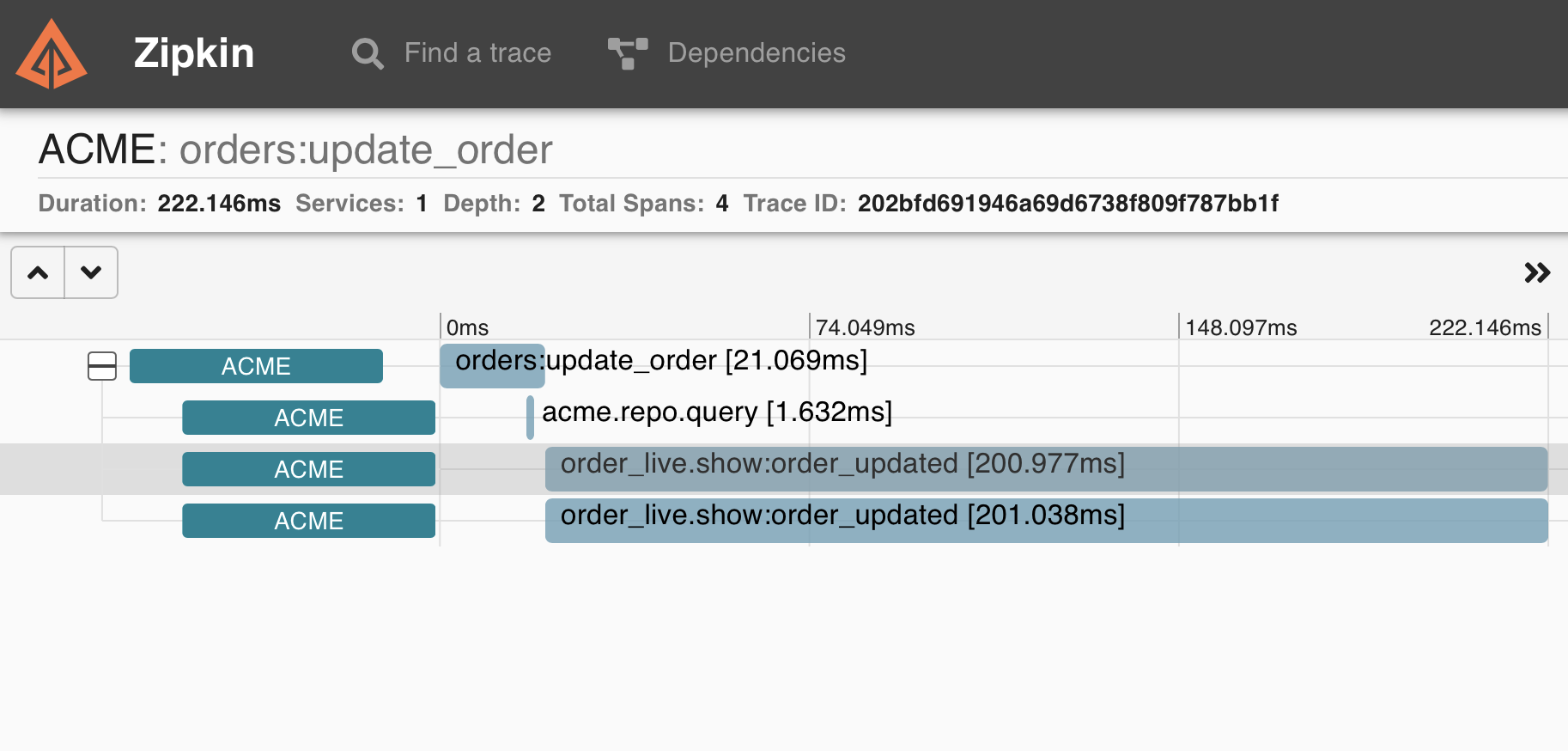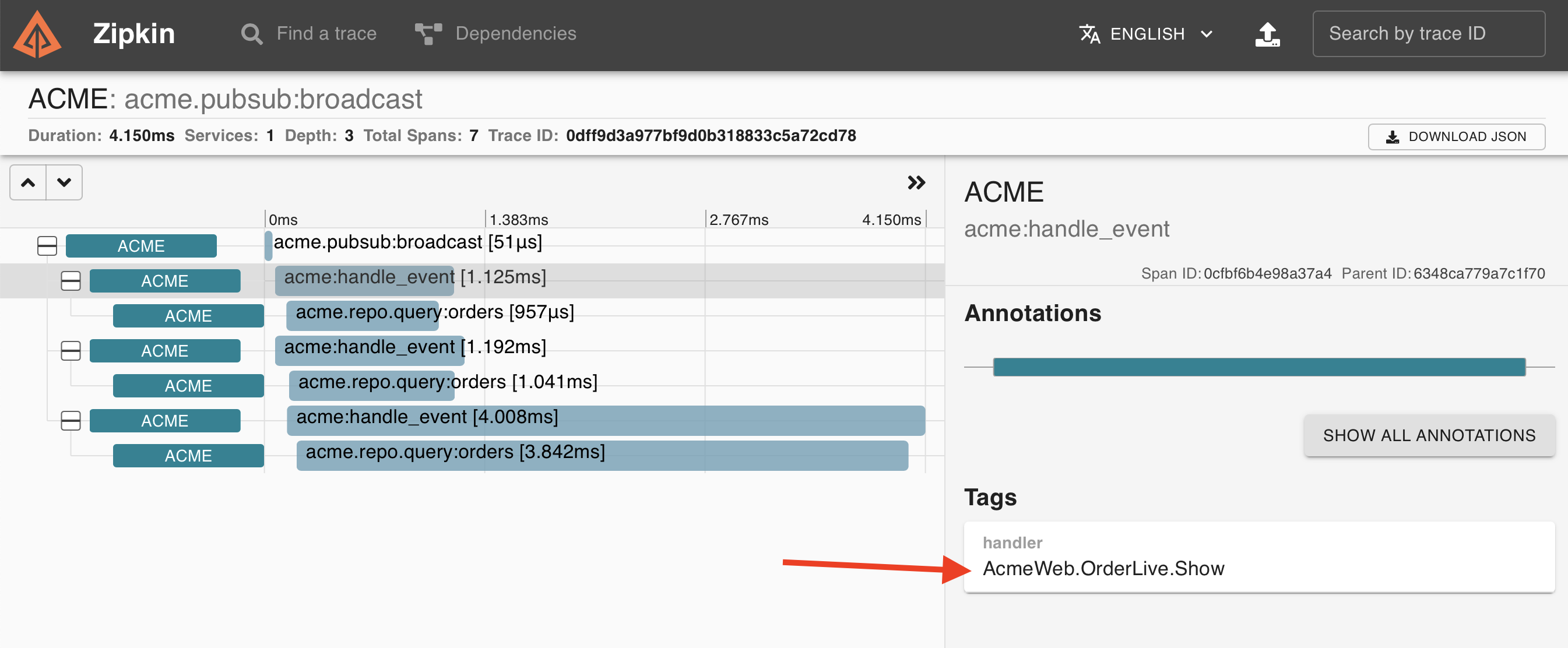TL:DR
The problem may occur when each PubSub subscriber does an expensive operation based on payload once an event is received that could have been done prior to broadcasting the message. Instrumentation with tracing telemetry can help to detect those.
Lately I’ve been playing more with Phoenix LiveView and Surface-UI. I enjoy building rich UI with almost no custom JS and getting more used to thinking differently about interactivity, when the state is pushed to the user from the Back-End not upon the request from the client, but upon the data update. I noticed a potential place where some sort of a N+1 problem, that I haven’t dealt with before, could appear if the developer is not careful (as with any types of N+1 problems).
During the development of the LiveView UI, to quickly test the whole result, sometimes I just open 2 browser windows on the same view, change the data and see the broadcasted message pushed down to clients that didn’t interact with the UI but receive an update. And that’s when the hidden problem can occur.
A sample app with LiveView and PubSub
Let’s take a look at the example. Say, we put together a service for “ACME” to track orders and their statuses. The order status is either “placed”, “shipped” or “delivered”. All connected users should see the update once it happens.
Let’s create a phoenix app:
$ mix phx.new acmeand generate “Orders” context.
$ mix phx.gen.live Orders Order orders account_id:integer status:integer
That task would generate for us a context with liveview to do minimal CRUD operations. Notice that status is an :integer. We want to use Ecto.Enum to map the status code to the “name”. Change the field type in the schema definition in “lib/acme/orders/order.ex”
...
schema "orders" do
field :account_id, :integer
field :status, Ecto.Enum, values: [placed: 1, shipped: 2, delivered: 3]
timestamps()
end
...And let’s change the generated form input box from type “number” to “select”. In “lib/acme_web/live/order_live/form_component.html.heex” change the status field:
...
<%= label f, :status %>
<%= select f, :status, Ecto.Enum.values(Orders.Order, :status), prompt: "Order status" %>
<%= error_tag f, :status %>
Now let’s add some minimal PubSub to broadcast the updates from Orders context. Change function update_order/2 in “/lib/acme/orders.ex” to:
def update_order(%Order{} = order, attrs) do
order_changeset = Order.changeset(order, attrs)
with {:ok, order} <- Repo.update(order_changeset) do
Phoenix.PubSub.broadcast(Acme.PubSub, "orders:#{order.id}", {:order_updated, order})
{:ok, order}
end
end
We also need to subscribe to that topic from OrderLive.Show. Inside handle_params/3 callback add:
if connected?(socket), do: Phoenix.PubSub.subscribe(Acme.PubSub, "orders:#{id}")
where id is order id.
And add handle_info/2 callback to reassign new order once broadcasted:
def handle_info({:order_updated, order}, socket) do
{:noreply, assign(socket, :order, order)}
end
Now when the order is updated all users connected to OrderLive.Show will see the changes.
The tricky part.
It’s important to keep in mind that LiveView spawns an erlang process for each connected client.
Therefore, since each of them receive the update, handle_info/2 callback performs individually for each client. Hence, we should avoid any expensive operation, such as DB calls, remote service calls etc. in that callback.
Just don’t do anything expensive in there. Sounds simple, right? However, in practice in larger systems when requirements change and multiple modules are already subscribed to particular updates - some of them eventually might require some extra info or side effects when update happens.
For example, imagine that in the “ACME” a new requirement, if an order is shipped - we want to load and show the information about the shipping agency that takes care of the particular delivery. And there could be a temptation to add that code to liveview, because on first glance it seems like we just want to “show that info to viewers”.
def handle_info({:order_updated, order}, socket) do
order = preload_shipping_agency(order)
{:noreply, assign(socket, :order, order)}
end
It might work fine and when testing locally. We won’t notice any issue, but it will try to preload shipping agency N times, where N is the number of connected clients.
How to detect the problem?
Overall it’s a good practice to have the project well instrumented and setup with observability. Similar to any kind of N+1 problems, this can be spotted relatively easily with tracing.
Let’s see how we can instrument it with OpenTelemetry and, for, at least, local development, observe traces in OpenZipkin.
In a separate terminal tab let’s start zipkin server:
$ docker run -d -p 9411:9411 openzipkin/zipkinNow let’s define required dependencies in “mix.exs”:
defp deps do
[
...
{:opentelemetry, "~> 1.0"},
{:opentelemetry_api, "~> 1.0"},
{:opentelemetry_ecto, "~> 1.0"}
{:opentelemetry_phoenix, "~> 1.0"},
{:opentelemetry_zipkin, "~> 1.0"},
]setup default tracers for phoenix and ecto in “application.ex”:
def start(_type, _args) do
OpentelemetryPhoenix.setup()
OpentelemetryEcto.setup([:acme, :repo])
...
endAnd let’s also configure exporter to zipkin in either “config/dev.exs” or “config/config.exs” add:
config :opentelemetry, :processors,
otel_batch_processor: %{
exporter: {:opentelemetry_zipkin, %{address: 'http://localhost:9411/api/v2/spans'}}
}Now let’s create traces.
First we need to require OpenTelemetry.Tracer as it provides with macros to create spans.
defmodule AcmeWeb.OrderLive.Show do
use AcmeWeb, :live_view
require OpenTelemetry.Tracer
...
and update handle_info/2 with:
def handle_info({:order_updated, order}, socket) do
span_opts = %{attributes: %{user: inspect(self())}}
OpenTelemetry.Tracer.with_span "order_live.show:order_updated", span_opts do
# expensive operation like DB call, service call.. etc.
Process.sleep(70)
{:noreply, assign(socket, :order, order)}
end
end
For the purpose of the example we pretend that each viewer-user is represented by its live_view pid. We add :user attribute to differentiate between spans created for each user.
Set the env variable OTEL_SERVICE_NAME and start the server like:
OTEL_SERVICE_NAME=acme iex -S mix phx.serverNow if we try to trigger a broadcast to multiple connected windows - we should see in Zipkin UI multiple spans created.
However, as you notice, spans are not part of the same trace, because the span context by default is local for the erlang process, while, as mentioned earlier, each LiveView connection lives in its own process. In order to overcome this we could start a span when an update happens, and pass its context as part of the broadcasted event message. In Acme.Orders update update_order/2 to be like:
def update_order(%Order{} = order, attrs) do
OpenTelemetry.Tracer.with_span "orders:update_order" do
order_changeset = Order.changeset(order, attrs)
with {:ok, order} <- Repo.update(order_changeset) do
ctx = OpenTelemetry.Tracer.current_span_ctx()
Phoenix.PubSub.broadcast(Acme.PubSub, "orders:#{order.id}", {:order_updated, order, ctx})
{:ok, order}
end
end
end
And in the OrderLive.Show.handle_info/2 set the span context:
def handle_info({:order_updated, order, ctx}, socket) do
OpenTelemetry.Tracer.set_current_span(ctx)
opts = %{attributes: %{user: inspect(self())}}
OpenTelemetry.Tracer.with_span "order_live.show:order_updated", opts do
# expensive operation like DB call, service call.. etc.
Process.sleep(70)
{:noreply, assign(socket, :order, order)}
end
endNow when we trigger broadcast, a single trace with multiple spans occurs in Zipkin UI.

That’s it in a nutshell!
The code with calls to OpenTelemetry everywhere looks boilerplaty, but this should be enough to make it work.
Thoughts on how to make it beautiful.
One thing comes to mind is to create a helper for broadcasting, that would wrap the event into a struct where it would also pass the OpenTelemetry context.
Let’s create a module Acme.PubSub:
defmodule Acme.PubSub do
defmodule Event do
defstruct [:message, :span_ctx]
end
def broadcast(topic, message) do
require OpenTelemetry.Tracer
OpenTelemetry.Tracer.with_span "acme.pubsub:broadcast" do
event = %Event{message: message, span_ctx: OpenTelemetry.Tracer.current_span_ctx()}
Phoenix.PubSub.broadcast(__MODULE__, topic, event)
end
end
end
New let’s update Orders.update_order/2 to use our new custom broadcast function:
def update_order(%Order{} = order, attrs) do
order_changeset = Order.changeset(order, attrs)
with {:ok, order} <- Repo.update(order_changeset) do
Acme.PubSub.broadcast("orders:#{order.id}", {:order_updated, order})
{:ok, order}
end
endNow, for the subscriber side we would want to “unwrap” that struct, set a context and pass the message down to the module to handle it normally. That could be done via code injection:
Let’s add to Acme.PubSub macro __using__:
defmodule Acme.PubSub do
...
defmacro __using__(_opts) do
quote do
def handle_info(%Acme.PubSub.Event{} = event, socket) do
OpenTelemetry.Tracer.set_current_span(event.span_ctx)
handle_info(event.message, socket)
end
end
end
end
and use Acme.PubSub in OrderLive.Show
defmodule AcmeWeb.OrderLive.Show do
use AcmeWeb, :live_view
use Acme.PubSub
...
end
Now we could remove all OpenTelemetry relate boilerplate from handle_info/2:
defmodule AcmeWeb.OrderLive.Show do
...
@impl true
def handle_info({:order_updated, order}, socket) do
# expensive operation like DB call, service call.. etc.
# for the example we'll do a function call that results in DB query, which is already instrumented via OpenTelemetryEcto
order = Orders.get_order!(order.id)
{:noreply, assign(socket, :order, order)}
end
...
endMuch cleaner, isn’t it? However, some more information about what module causes N+1 and where broadcast was made from would be helpful to find out the source of the problem.
We could “inject” that info into spans and still have relatively clean code using macros:
Let’s convert our Acme.PubSub.broadcast/2 into macro:
defmodule Acme.PubSub do
...
defmacro broadcast(topic, message) do
quote do
current_function = Acme.PubSub.current_function(__ENV__)
Acme.PubSub.broadcast_from_function(unquote(topic), unquote(message), current_function)
end
end
def broadcast_from_function(topic, message, function_name) do
require OpenTelemetry.Tracer
opts = %{attributes: %{broadcaster: function_name}}
OpenTelemetry.Tracer.with_span "acme.pubsub:broadcast", opts do
event = %Event{message: message, otel_ctx: OpenTelemetry.Tracer.current_span_ctx()}
Phoenix.PubSub.broadcast(__MODULE__, topic, event)
end
end
def current_function(env) do
{fun, arity} = env.function
"#{inspect(env.module)}.#{fun}/#{arity}"
end
end
This macro broadcast/3 gets the current function name from where it’s used, and calls Acme.PubSub.broadcast_from_function/3 which does the same as the previous broadcast/2 function did but also sets the :broadcaster attribute.
Because Acme.PubSub.broadcast/2 now is a macro we just need to require the Acme.PubSub in Acme.Orders before using it:
defmodule Acme.Orders do
...
require Acme.PubSub
...
end
Similarly we could add info about the module that handles the broadcasted event. Let’s add a span with :handler attribute to injecting handle_info/2 that would suggest the name of the handler process:
defmodule Acme.PubSub do
...
defmacro __using__(_opts) do
quote do
def handle_info(%Acme.PubSub.Event{} = event, socket) do
require OpenTelemetry.Tracer
OpenTelemetry.Tracer.set_current_span(event.span_ctx)
opts = %{attributes: %{handler: inspect(__ENV__.module)}}
OpenTelemetry.Tracer.with_span "acme:handle_event", opts do
handle_info(event.message, socket)
end
end
end
end
...
end

Voilà! 🎉
Praemonitus praemunitus!
Now, since we are aware of the issue, we can think of moving the expensive operation to context, to be done prior to broadcasting, and either include into broadcasted message or, if only one type of a subscriber requires it, broadcast in a separate topic.
Thank you for reading!
